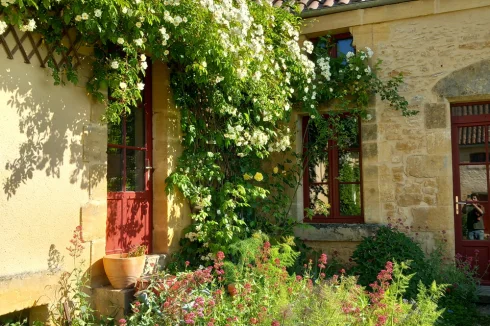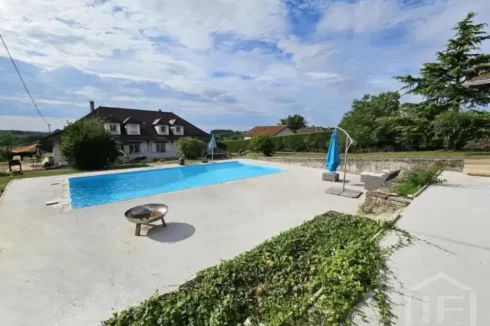Does a French Marriage Contract Make Sense?
Wednesday 08 September 2021
In order to get around French inheritance laws many international buyers adopt a post-nuptial French marriage contract, but it is not always necessary or possible to do so.
As is now widely understood, French inheritance laws do not permit you to dispose of your estate as you wish. Your bloodline or adopted children have entrenched inheritance rights.
Even non-residents are caught by the rule, for real estate in France is subject to French inheritance laws. Nevertheless, since 17 August 2015, it has been possible to get around the reserved inheritance laws by making an election of the law of your nationality under the EU Succession Regulation 650/2012, if your national law allows testamentary freedom. This is the case for England and Wales, and to a lesser extent, Scottish law.
Prior to 2015, many British owners of French property would set up a French property holding company, called a Societe Civile- Immobiliere (SCI), as the legal vehicle to purchase the property. The property ownership was then changed from being immovable property, to being shares in a company, which are movable assets and dealt with under the law of your domicile, usually being the law of the place where you live. It didn’t work for France resident Brits though, as the law of where they lived was French law.
The level of the réserve héréditaire to the benefit of children depends on the number of children:
- One child - half of the estate;
- Two children - two-thirds of the estate;
- Three + children - three-quarters of the estate.
When stated in such stark terms it all sounds rather unpalatable for the surviving spouse/civil partner, who is not the automatic single beneficiary of the estate of the deceased.
However, it is not quite as bad as it seems, for statute law does not leave a surviving spouse/civil partner without legal protection.
In addition, the surviving spouse is entitled to at least one-quarter of the estate of the deceased, or they can opt for life-use (usufruit) of the entire estate (unless there are step children and no Will). They cannot be turfed out of their principal home by their children, although they do not have complete freedom of action, eg sale.
Nevertheless, many couples consider these basic rights are insufficient, and restrictive, preventing the surviving spouse from easily deciding their own future, and also having to share the proceeds of the inheritance may leave them in financial difficulty. The issue can become particularly difficult where family relations are fractured.
Under The Hague Marriage Convention 1978, it is possible for those who are residents of France to enter into a marriage contract, which governs the administration and disposal of property during the marriage. This right existed for both resident and non-resident property owners but now no longer for the latter.
The favoured marriage contract of many international buyers is called regime de communauté universelle, with the clause d’attribution intégrale, which prescribes that all property in the marriage is communally owned, including that gifted to or inherited personally by one of the spouses.
On the death of the first spouse the surviving spouse automatically becomes sole owner of all of the property, and the rights of the children are deferred.
So the main purpose of the marriage contract is to give complete freedom of action to the surviving spouse, and with longer life expectancy that is a factor that has become of greater importance to couples.
With the growth in second marriages many families now comprise children from a former marriage, a situation that has significant consequences for those wishing to enter this type of marriage contract.
This is because they are not permitted to enter into such a contract without consent of all affected parties when there are children from outside of the marriage, due to the fact that it disinherits at least one set of children; only the children who are blood relatives of the deceased would have any inheritance rights on the death of the surviving spouse.
Some couples mistakenly think they can get around this rule by simply not confiding it to the notaire, but even if the notaire is fooled it may not be the case with those children who are disenfranchised, who can later challenge the contract and the inheritance itself, as does occur.
Since 2019 it has not been possible for non France residents to adopt the communauté universelle marriage regime, but it remains available to residents of France, but do not rely on it for non French assets.
John Kitching, a legal expert dealing in French inheritance law states that: "The simplest option for most British nationals who want to disinherit their children in favour of their spouse, whether living in France or not, is to arrange for an expert in French and English law to draft a Will electing the law of their nationality under the EU Succession Regulation."
Inheritance Tax Implications
Where the spouse inherits on the first death, and the children do not inherit until the death of the second spouse, there can be inheritance tax disadvantages for them.
The surviving spouse inherits completely free of inheritance tax. The children then only inherit from the surviving parent, and can only use their €100,000 tax free allowance on the second death. Had they inherited from both parents, they could have benefitted from the tax free allowance on both deaths.
So, in a family of four if the children inherit from both parents, there is no inheritance tax arises for the two children if the estate is valued less than €400,000.
Where the surviving spouse inherits on the first death (eg by marriage contract or Will electing national law) the tax free allowance is reduced to €200,000, being €100,000 for each child, as the property becomes the sole property of the surviving spouse and only their allowance can be used.
Even this may not be a significant issue. Thus, where the estate is valued at €500,000, if surviving spouse inherits, this increases the tax liability of two children from around €6,000 to €56,000, perhaps not a huge sum in the scheme of things, particularly if shared between them, and it depends of course on whether there is inheritance tax due in other countries for offsetting.
It is also possible to reduce the losses by stipulating the assets that are transferred into the estate, to specifically exclude some assets, or to omit use of the clause d’attribution intégrale and attribute only life-use (usufruit). This would enable the children to make use of their allowances in full, but would limit the effectiveness of the intended freedom and control for the surviving spouse, which is probably the main purpose of entering into the contract in the first place.
It may well then simply depend on whether the relationship you have with your children is such that you could live with that arrangement. If the relationship is strong, and you intend that they should inherit your estate, there may simply be no need at all to enter into the contract, or other mechanism for allowing the surviving spouse to inherit the whole estate.
Notaire Costs and Taxes
The costs of the marriage contract may also be a factor some couples will need to consider.
If no property is being transferred from single ownership into the marriage, the notaire charges are normally no more than a few hundred euros.
However, where a property is being transferred into the contract (where one is owned by only one of the spouses) then costs increase to at least several thousand euros, as stamp duty is payable.
There is also considerable evidence of overcharging by notaires, an issue we considered in our article The Costs of a French Marriage Contract.
Choice of national law - EU Succession Regulation
As an alternative to a marriage contract, since August 2015 it has been possible for foreign nationals living in the EEA to adopt their country of origin inheritance rules ('Brussels IV'), as we set out in our article Inheritance in France Under European Succession Law. You need to elect for this option through a Will.
The great advantage is that no enforced inheritance rules apply whatsoever, but freedom to leave to whom you wish does not exempt the beneficiary from potential liability French inheritance taxes, which continue to apply in the usual manner.
The option is particularly useful for those living in free union or in a civil partnership, although whilst a civil partnership attracts the same inheritance tax exemptions as for married couples, people who are simply co-habiting or informal couples, even long standing, would face 60% inheritance tax.
This right to opt for national law to apply to inheritance rules for UK nationals remains in place following Brexit.
A new law passed in France in 2021 does appear to undermines these rights, but our own legal advisors consider that the law is contrary to European law, which is supreme and will face legal challenge.
It is, however, worth noting that even under the law of England and Wales, it is possible to challenge an inheritance if a person financially dependent on the deceased has not been left adequate provision.
Assurance Vie
The use of assurance vie is also a good inheritance tax planning option, as up to €152,000 such policies can be tax free, and can be left to whom you wish. Good professional advice is essential.
You can read more at Life Insurance in France from where you can also reach English-speaking specialists of this product.
Civil Partners/Free Union
For those in a civil partnership or living in free union, you can read more in our guide below where these and other options are reviewed.
Thank you for showing an interest in our News section.
Our News section is no longer being published although our catalogue of articles remains in place.
If you found our News useful, please have a look at France Insider, our subscription based News service with in-depth analysis, or our authoritative Guides to France.
If you require advice and assistance with the purchase of French property and moving to France, then take a look at the France Insider Property Clinic.





